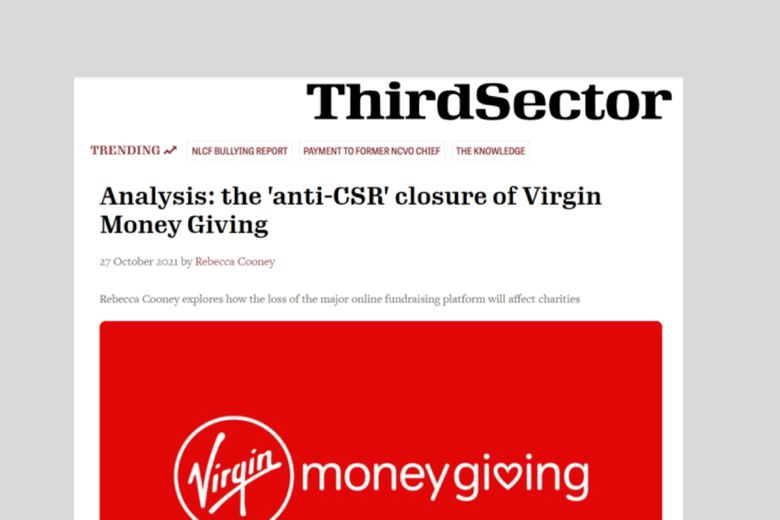
Vimal Patel08/12/21
4 min read

The Virgin Money Giving platform stopped taking donations from November 30th, posing problems for individual charities and questions for the sector as a whole.
Some people were upset at the short notice that charities were given - the announcement to close was made four months before the lights went out - meaning they needed to quickly source a new way of attracting online donations.
Accusations have been made about Virgin’s intentions for the platform, particularly as the closure was seen as a cost-cutting exercise, therefore questioning any philanthropic purpose.
And commentators have questioned the entire approach, which was driven by a PR message that donation platforms should avoid making profits. Why should a private, for-profit business such as Virgin be in the position to make such a statement?
Following the collapse of Virgin Money Giving, and BT MyDonate before it, any future attempts by big corporations to enter this space will undoubtedly come with a large dollop of skepticism.

Virgin Money Giving (VMG) was set up in 2009 when Virgin Money began its sponsorship of the London Marathon. It charged a 2% transaction fee to cover operational costs, immediately making it an attractive alternative to the biggest name in the market, Just Giving, which at the time was charging a 5% transaction fee.
VMG proved instantly popular and in its 12 years of existence it supported more than 20,000 charities and raised more than £900 million. Despite the subsequent criticism, during this period it did a lot of good for the sector.
Undoubtedly, its model also forced Just Giving to change theirs, the latter waiving its transaction fee in favour of users making a voluntary donation to the platform - but there are question marks about whether this is sustainable, especially for smaller competitors.
In July 2021, Virgin Money announced the closure of VMG following the end of its sponsorship of the London Marathon and a ‘strategic review’ of the service. A company statement said: “Given the significant investment required in the service for it to remain competitive, and without the brand exposure provided by the London Marathon, Virgin Money has decided to wind down the platform.”
The above statement provides a few pointers to why the platform was wound up. Those reading between the lines might suggest that:
And that’s understandable. Big corporations don’t enjoy absorbing big costs, and Virgin Money has recently announced significant numbers of redundancies and branch closures.

But it does raise questions about their participation in areas such as donation platforms. The Third Sector website published an article containing some strong criticism of Virgin Money.
Simon Scriver, co-founder of the fundraising events firm Fundraising Everywhere, said: “You can’t create your whole brand around the idea of putting charities and users first and then, when it doesn’t suit you, walk away at four months’ notice.
“This is actually a kind of anti-corporate social responsibility – proactively damaging charities for the sake of their business and their own personal gain.”

Online donations have become an important part of fund-raising - and the question right now is ‘What’s the best method of encouraging these?’
Alternatives to Virgin Money Giving obviously exist, of different shapes and sizes, and Charity Digital has a useful rundown of a number of those.
But the collapse of VMG should send a warning to charities: don’t put all your eggs in one basket.
Scriver said:

“While you don’t want to be on every platform, because it’s time-consuming, VMG’s closure shows us that when you work with just one supplier you put yourself at risk.”

And charities shouldn’t be looking solely at relying on third-party services; hosting their own platform gives them greater control and reduces the concern about sucking up whatever a third-party chooses to do.
Being a master of your own destiny is far more appealing, particularly for larger charities wanting and needing more granular control of their donations.
To that end, here at Giant we have built our own donation platform, which is customised for each charity which uses it. Based on extensive donor research and behavioural science, it offers a seamless donor journey from any charity website, whether integrated as part of a Giant designed website, or added on to an existing website using any standard CMS.
The Giant donation platform does not charge any transaction fees, however the payment providers - such as Stripe, PayPal and GoCardless - do. There is a one-off investment for the build and then a recommended monthly cost for hosting and maintenance.
Supporters are seeking more control over their donations and our platform provides a level of personalisation not seen on third-party services.
The Make-A-Wish UK charity launched a new website with us along with a completely redesigned and streamlined donation journey, and in the first six months of going live, they saw a year-on-year increase of 50% in online donation revenue.
Third-party donation platforms have an important role to play within the sector, but as we’ve seen with the closure of Virgin Money Giving, and BT MyDonate before it, charities would do well to avoid a reliance on just one platform.
Where they can, charities should encourage followers to donate via their own website and platform, and use more than one third-party provider. That way, when one does close the risk is significantly reduced.